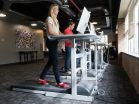(Press-News.org) Research showing the adverse effects of sedentary office work has given standing desks and treadmill desks new attention.
If you happen to be interested in using a treadmill desk, your greatest challenge may be convincing your boss. Fortunately, two BYU researchers have good news: People on treadmill desks perform cognitive tasks nearly as well as those at sitting desks, despite the fact that they're walking.
In a study published Wednesday in PLOS One, exercise science professor James LeCheminant and neuroscientist Michael Larson report their findings after putting treadmill desks to the test. The duo compared the cognitive performance of healthy adults sitting at a desk to those using treadmill desks while carrying out the same tasks.
While they found the walkers showed slight decreases in processing speed, attention and typing words per minute--tasks that require fine-motor skills or heavy concentration--the overall drop was not enough to warrant major concern.
"Though statistically significant, we are not talking about major differences between the treadmill walking and sitting conditions," LeCheminant said. "Rather, these are very modest differences."
In other words, the health benefits of a walking desk shown by previous research appear to outweigh the slight drop in productivity that comes with such a setup.
LeCheminant and Larson strongly support the use of treadmill desks, sit-stand desks, and any other efforts to safely improve physical activity in the work place. In fact, Larson is planning on getting a treadmill desk himself in light of his research.
With that in mind, here's a quick list of things treadmill desk hopefuls can tell their boss (based on previous research as well as LeCheminant and Larson's findings):
Academic research supports them as a way to increase physical activity at work
Thinking abilities only drop slightly when using one, but not below average performance marks
Sitting at a desk all day could be shaving years off your life
A neuroscience professor at a research institution is getting one after studying them
"For health alone it's great, but if the cognitive decline is small, than you bet it's worth it," Larson said. "The health benefits likely outweigh any slight performance dips you may get from implementing the treadmill desk."
For the study, the duo and their BYU student team assessed 75 healthy adults, half using treadmill desks, half using regular desks, for a 45-minute period. The 37 people on treadmill desks walked at a speed of 1.5 mph. Walkers saw a 9 percent drop in cognitive processing speed, attention and working memory and a 13-word-per-minute drop in typing.
Their findings show that treadmill desks may be most appropriate to use during tasks that are less cognitive-demanding (checking email) or do not require a great deal of fine-motor skills (non-typing tasks).
Larson said professor friends who use treadmill desks step off when they have a task that requires high concentration, such as intense reading and editing. That said, researchers were surprised to find treadmill walkers retained their learning just as well as sitters, even if it took them longer to process it in the first place.
"They're not going to get it as fast, but in the long run they're going to get it," Larson said. "While walkers don't learn as fast as the sitters, they were able to retain the information as well later on."
Researchers say there is room for much more exploration on the subject. One question their study did not address was whether individuals improve their cognitive performance or typing performance with practice on a treadmill desk over time.
"Simply put, we still need to have more data to determine the effectiveness of treadmill desks for a host of other outcomes related to cognition and productivity," LeCheminant said.
INFORMATION:
Phytoplankton, commonly known as plant plankton that remove carbon dioxide from the atmosphere through photosynthesis, are potentially a key driver of Arctic warming under greenhouse warming, a study reveals.
Scientists with Pohang University of Science and Technology (POSTECH), Max Planck Institute for Meteorology (MPI-M), and Korea Institute of Ocean Science and Technology (KIOST), presented on Monday, April 20, in Proceedings of National Academy of Sciences (PNAS) Online, the geophysical impact of phytoplankton that triggers positive feedbacks in the Arctic warming ...
Sex differences in some behaviors are well established, but it's unclear whether differences still occur within highly selective sub-populations, such as expert financial decision makers or elite athletes. Researchers assessed the competitiveness of over 1,100 collegiate distance runners and tested whether the already-known sex difference in competitiveness narrowed when considering the fastest runners. They found the difference between genders was just as large among the fastest as it was among the slowest runners.
Whether or not sex differences disappear among selective ...
CINCINNATI - Researchers have identified a biological basis for asthmatic children who do not respond well to corticosteroid treatment - currently the most effective treatment for chronic asthma and acute asthma attack.
Conducted at Cincinnati Children's Hospital Medical Center, the study also identifies a genetic pathway that could open the possibility of new therapies for difficult-to-treat patients. The findings are reported April 21 in The Journal of Allergy and Clinical Immunology, published by the American Academy of Allergy Asthma and Immunology.
The researchers ...
In a new study published today in the British Journal of Nutrition, a team of researchers led by the University of Surrey, has found that front of package nutrition labels can enable consumers to make healthier food choices.
In recent years, a number of different front of package labels have been developed by industry and health promotion organisations. The majority of labels include values for energy, sugar, fat, saturated fat and salt, but some also include percentage Guideline Daily Amounts or traffic light colours to help consumers' understanding of the numerical ...
Preliminary findings presented at international TB vaccine conference suggest development and introduction of a "post-infection" vaccine could have a major impact in reducing TB disease in China
WHO currently estimates nearly 1 million new cases of TB in China every year
SHANGHAI (21 April 2015)--A major contributor to the number of tuberculosis infections and cases in China will likely be the elderly over the next few decades, requiring a refocus in efforts to control a disease affecting millions of people in the country, according to preliminary new research presented ...
In the 1950s computers were giant machines that filled buildings and served a variety of arcane functions. Today they fit into our pockets or backpacks, and help us work, communicate and play.
"Biotechnology today it is very similar to where computing technology used to be," said Ingmar Riedel-Kruse, an assistant professor of bioengineering at Stanford.
"Biological labs are housed in big buildings and the technology is hard to access," he added. "But we are changing that. We are enabling people to interact with biological materials and perform experiments the way they ...
PHILADELPHIA (April 21, 2015) - New research from the Monell Center reveals that tumor necrosis factor (TNF), an immune system regulatory protein that promotes inflammation, also helps regulate sensitivity to bitter taste. The finding may provide a mechanism to explain the taste system abnormalities and decreased food intake that can be associated with infections, autoimmune disorders, and chronic inflammatory diseases.
In addition to its role in mediating inflammation, TNF has been implicated in the progression of varied diseases ranging from Alzheimer's disease ...
*World-first: MRI used to study infant pain
*Finds 18 of 20 brain 'pain' regions activate in adults are active in babies
*Also suggests infants are more sensitive to pain than adults
*Highlights need to review pain relief for babies
The brains of babies 'light up' in a very similar way to adults when exposed to the same painful stimulus, a pioneering Oxford University brain scanning study has discovered. It suggests that babies experience pain much like adults.
The study looked at 10 healthy infants aged between one and six days old and 10 healthy adults aged ...
In research published today in the journal Cerebral Cortex, a team of scientists led by the University of Cambridge and the Medical Research Council (MRC) Cognition and Brain Sciences Unit, Cambridge, studied not only whether volunteers could be trained to follow their heartbeat, but whether it was possible to identify from brain activity how good they were at estimating their performance.
Dr Tristan Bekinschtein, a Wellcome Trust Fellow and lecturer in the Department of Psychology at the University of Cambridge, says: "'Follow your heart' has become something of a cliché, ...
Dutch doctors withhold/withdraw treatment in a substantial proportion of elderly patients, reveals research published online in the Journal of Medical Ethics.
But their decisions don't seem to be driven by ageism; rather, they are more likely based on considerations of comfort and respect and the avoidance of futile treatment, conclude the researchers.
In a bid to assess whether certain age groups are more likely to have treatment withheld or withdrawn, the researchers looked at a sample of deaths, stratified according to whether end of life decisions were likely or ...

